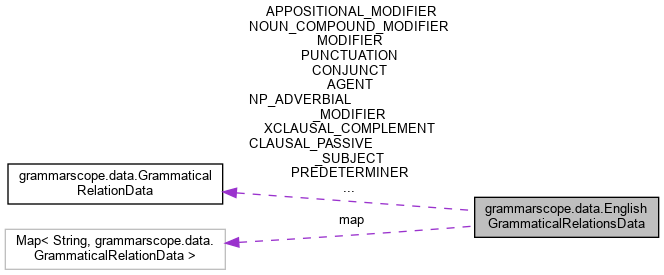= new GrammaticalRelationData( "CLAUSAL_COMPLEMENT", "ccomp", "clausal complement",
"COMPLEMENT",
"VP|SINV|S|ADJP|ADVP|NP(?:-.*)?",
new String[]{ "VP < (S=target < (VP !<, TO|VBG|VBN) !$-- NP)", "VP < (SBAR=target < (S <+(S) VP) <, (IN|DT < /^(?i:that|whether)$/))", "VP < (SBAR=target < (SBAR < (S <+(S) VP) <, (IN|DT < /^(?i:that|whether)$/)) < CC|CONJP)", "VP < (SBAR=target < (S < VP) !$-- NP !<, (IN|WHADVP) !<2 (IN|WHADVP $- ADVP|RB))", "VP < (/^V/ < /^(?i:tell|tells|told|telling)$/) < (SBAR=target < (S < VP) $-- NP !<, (IN|WHADVP) !<2 (IN|WHADVP $- ADVP|RB))", "VP < (SBAR=target < (S < VP) !$-- NP <, (WHADVP < (WRB < /^(?i:how)$/)))", "VP < @SBARQ=target", "VP < (/^VB/ < /^(?i:have|had|has|having|'ve|’ve|ve|v|'d|’d|d|hvae|hav|as)$/) < (S=target < @NP < VP)", "VP < (@SBAR=target !$-- @SBAR|S !$-- /^:$/ [ == @SBAR=sbar | <# @SBAR=sbar ] ) < (/^V/ < /^(?i:ask|asks|asked|asking|know|knows|knew|knowing|specify|specifies|specified|specifying|tell|tells|told|telling|understand|understands|understood|understanding|wonder|wonders|wondered|wondering)$/) [ < (/^V/ < /^(?i:tell|tells|told|telling)$/) | < (=target !$-- NP) ] : (=sbar < (WHADVP|WHNP < (WRB !< /^(?i:how)$/) !$-- /^(?!RB|ADVP).*$/) !< (S < (VP < TO)))", "@S|SINV < (@S|SBARQ=target $+ /^(,|\\.|'')$/ !$- /^(?:CC|CONJP|:)$/ !$- (/^(?:,)$/ $- CC|CONJP) !< (VP < TO|VBG|VBN) !< (VP <1 (VP [ <1 VBG|VBN | <2 (VBG|VBN $-- ADVP) ]))) !< (@S !== =target $++ =target !$++ @CC|CONJP)", "ADVP < (SBAR=target [ < WHNP | ( < (IN < /^(?i:as|that)/) < (S < (VP !< TO))) ])", "ADJP < (SBAR=target !< (IN < as) < S)", "S <, (SBAR=target <, (IN < /^(?i:that|whether)$/) !$+ VP)", "@NP < JJ|NN|NNS < (SBAR=target [ !<(S < (VP < TO )) | !$-- NP|NN|NNP|NNS ] )", "VP < (/^V/ < /^(?i:say|says|said|saying|(?:add|boast|counsel|explain|inform|interject|recall|remark|respond|proclaim|report|claim|shout|whisper|yell)(?:s|ed|ing)?|(?:advis|announc|acknowledg|conced|conclud|decid|declar|observ|stat|not|inton)(?:e|es|ed|ing)|(?:confess)(?:es|ed|ing)?|(?:agree)(?:s|d|ing)?|reply|replied|replies|replying|admit|admits|admitted|admitting|hold|holds|holding|held|write|writes|writing|wrote|tell|tells|telling|told|quipped|quip|quips|quipping|think|thinks|thinking|thought)$/) < (S|S-CLF|S-TTL|SQ=target <+(S) (VP < /^VB[DZP]$/))", "@S < /^S-TPC/=target < VP" },
"The \"clausal complement\" grammatical relation. A clausal complement of a verb or adjective is a dependent clause with an internal subject which functions like an object of the verb, or adjective. Clausal complements for nouns are limited to complement clauses with a subset of nouns like \"fact\" or \"report\". We analyze them the same (parallel to the analysis of this class as \"content clauses\" in Huddleston and Pullum 2002). Clausal complements are usually finite (though there are occasional exceptions including remnant English subjunctives, and we also classify the complement of causative \"have\" (She had him arrested) in this category.",
new String[][]{ { "He says that you like to swim","ccomp(says, like)" }, { "I am certain that he did it","ccomp(certain, did)" }, { "I admire the fact that you are honest","ccomp(fact, honest)" } }
)



 1.8.17
1.8.17